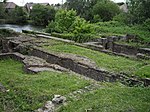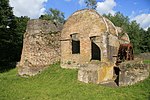Waltham Abbey is a town and civil parish in the Epping Forest District of Essex, within the metropolitan and urban area of London, England, 14 miles (23 km) north-east of Charing Cross. It lies on the Greenwich Meridian, between the River Lea in the west and Epping Forest in the east, with large sections forming part of the Metropolitan Green Belt. It borders Nazeing and Epping Upland to the north, Chingford to the south, Loughton, Theydon Bois and Buckhurst Hill to the east and south-east, and Waltham Cross, Cheshunt and Enfield to the west.
Historically an ancient parish named Waltham Holy Cross in the Waltham hundred of Essex, it became a local government district in 1850, and was granted urban district status in 1894. Whilst the use of the name Waltham Abbey for the town dates back to the 16th century at the earliest, the parish itself was not renamed until 1974, when the Waltham Holy Cross Urban District was abolished and succeeded by Waltham Abbey Town Council. The town council is based at Waltham Abbey Town Hall, and operates as part of the wider Epping Forest District. The town was included in the Metropolitan Police District in 1840, and the London postal district upon its inception in 1856. As a London suburb, the town formed part of the review area for the Royal Commission on Local Government in Greater London, but did not become part of the proposed Greater London administrative area in 1965, remaining in the Essex County Council area, unlike most other parts of metropolitan Essex.
The town takes its name from and is renowned for its former abbey, the last in England to be dissolved, now the Abbey Church of Waltham Holy Cross and St Lawrence, a scheduled ancient monument and the town's parish church. It is believed to be the final resting place of King Harold Godwinson, who died in the Battle of Hastings in 1066. The town is twinned with the German town of Hörstel.










